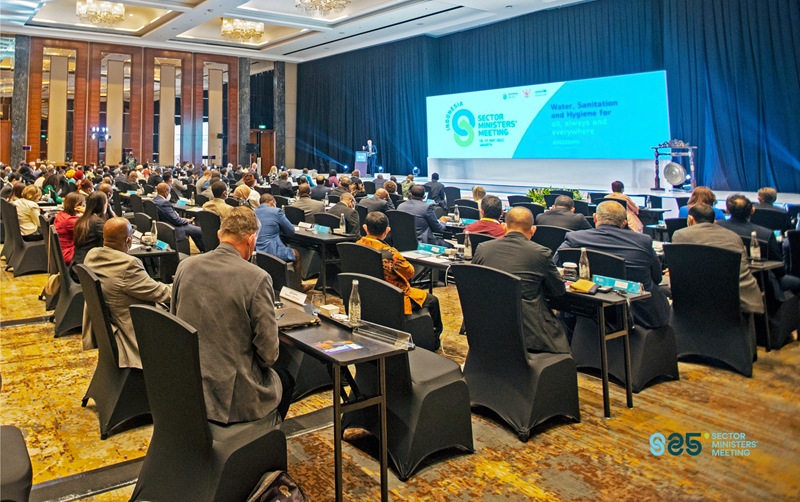Does the world need another high-level meeting right now? Yes, it does.
In October, Spain will host SWA’s Sector Ministers’ Meeting (SMM) in Madrid, co-convening with SWA and UNICEF. SMMs, high-level meetings facilitated by the SWA Partnership, convene ministers responsible for water, sanitation and hygiene, and their counterparts responsible for climate, environment, health and the economy.
These meetings provide a space for leaders around the world to discuss strategies, identify solutions and find innovative ways to increase the political prioritization of water, sanitation and hygiene. SMMs also provide attendees with research, information and in-depth discussions on matters currently facing the sector. Government leaders can meet with top-ranking officials at the UN and donor agencies, international financial institutions, civil society, the private sector and others. These meetings are the only regular, minister-focused, global forum dedicated to water and sanitation.
The Agenda for Madrid
This year’s SMM aims to encourage action toward integrating water, sanitation, and climate issues. It seeks to equip ministers with the necessary evidence, insights, and partnerships to shift the current emphasis on water supply and sanitation toward a more holistic approach. This direction will incorporate water resource management and climate resilience, supported by sustainable financing to operate at scale and ensure that the human rights to water and sanitation are upheld. Spain is familiar with intense water scarcity exacerbated by climate impacts and has a long tradition in managing scarce water resources and policy integration at the basin level.
The world is experiencing multiple crises that threaten the aim of achieving universal and sustainable access to water, sanitation, and hygiene. The growing impacts of climate change, lack of integrated water resources management, and environmental degradation are compounded by economic instability, reductions in foreign assistance, and conflict. In many cases, hard-won developmental gains are being threatened if not reversed, exacerbating existing vulnerabilities.
Climate change disrupts the water cycle in which all life ultimately depends, undermining the human rights to water and sanitation by affecting the availability, accessibility, and quality of freshwater resources.
Many people, especially the most marginalised, experience climate change through the increasing impacts of severe floods and drought events.
This situation will worsen without urgent and coordinated steps that integrate water supply and sanitation service delivery with water resources management and climate action. Failure to do this will not only undermine public health and the empowerment of women and girls, but will also profoundly impact economic growth. This is why the actions that will come from this year’s SMM are so critical right now.
A Compact for Action
While the SMM's principal focus is on nationally-led action, it will also contribute significantly to the intergovernmental water process, including COP30 and the 2026 UN Water Conference,,by encouraging a multi-sectoral dialogue involving various stakeholders covering all aspects of water security.
The link between the SMM and SWA’s Heads of State Initiatives (HoSI) are vital, recognising that political leadership at the highest level is needed to remove bottlenecks in integration and generate momentum beyond the direct sphere of influence of any sector minister. HoSI seeks to establish political commitment and translate this into concrete results.
To promote the integration of water and sanitation, water resource management and climate action, and reinforce the value of HoSI, the 2025 SMM will launch a High-level Leaders Compact on Water Security and Resilience.
This political declaration will promote the integration of water and sanitation strategies with integrated water resources management and the critical need for sustainable sector financing through nationally led action, while advocating for water and sanitation to be recognised as a fundamental pillar in climate negotiations. The Compact will be an essential milestone for COP30 and the 2026 UN Water Conference in promoting Heads of State Initiatives as a gamechanger to accelerate progress towards water and sanitation targets of Sustainable Development Goals.
Practical Preparation & Support
In April we kicked off a robust six-month-long multi-stakeholder preparatory process which supports ministers in preparing for their participation in the SMM and getting the most out of the meeting. This process involves multiple sectors spanning the water and sanitation, water resource management and climate divide and includes a range of stakeholders, who will gather under government leadership to assess the progress achieved to date, highlight key bottlenecks and successes, and identify practical actions needed to integrate water and sanitation, water resource management and climate action, to improve performance and to attract a greater share of domestic and private finance.
As a result, ministers and government leaders arrive to the SMM ready to problem-solve and take collective action. Ministers, working in concert with their development partners, are well placed to address the complex challenges facing them---taking concrete actions to drive integration, introducing and accelerating reforms that will strengthen performance, build resilience, and attract the finance needed to achieve universal access. This year’s Sector Ministers’ Meeting will support them in that.
Our work on realizing the human rights to water and sanitation is supported by the European Commission.


